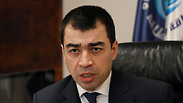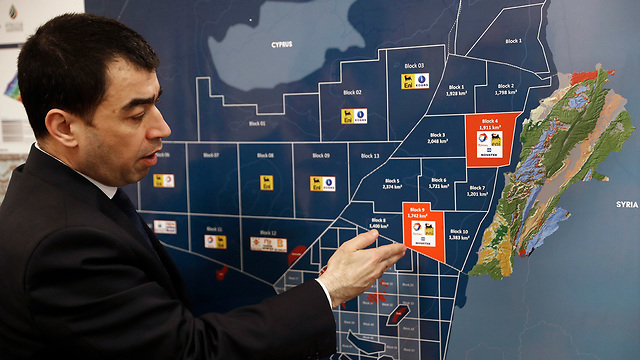

Minister: Lebanon will fully use energy block disputed by Israel
Beirut signs first offshore oil and gas exploration and production contracts for two blocks, including Block 9 which borders Israeli waters; senior official from France's Total, which is one of three companies to sign the agreements, says 'There is no reason not to proceed' with deal.
Lebanon's energy minister said on Friday there would be full exploration in an offshore energy block that partially lies in waters disputed by neighboring Israel.
Lebanon said on Friday it had signed its first offshore oil and gas exploration and production contracts for two energy blocks, including the disputed Block 9.
A consortium of France's Total, Italy's Eni and Russia's Novatek signed the agreements for the two blocks, which are among five that Lebanon put up for tender in the country's much-delayed first licensing round.
Israel and Lebanon have exchanged threats and condemnation over the tender, amid rising tensions over territorial and marine boundaries between them.
Israeli Defense Minister Avigdor Lieberman described Lebanon's exploration tender as "very provocative" and suggested that Lebanon had put out invitations for bids from international groups for a gas field "which is by all accounts ours."
His comments drew sharp condemnation from the militant Hezbollah group and Lebanese officials, including Prime Minister Saad Hariri, a Western ally, who described Lieberman's comments as a "blatant provocation that Lebanon rejects."
"Today, we announce that we have started our petroleum path ... after signing the agreements and launching the exploration activities," Lebanese Energy Minister Cesar Abi Khalil said at a ceremony in Beirut.
The contracts had already been signed on January 29.
Data suggests there are reserves in Lebanon's waters, but no exploratory drilling has taken place to estimate their size.
Abi Khalil has said a second offshore licensing round will happen once the first commercially viable discovery is made.
The first exploratory well will be drilled in Block 4 in 2019, said Stephane Michel, Total's head of exploration and production in the Middle East and North Africa.
The second well will be drilled in Block 9 more than 25 km (15 miles) from the maritime border claimed by Israel, he said at the ceremony.
Lebanon has an unresolved maritime border dispute with Israel over a triangular area of sea of around 860 sq km (330 square miles) that extends along the edge of three of its total 10 blocks.
Israel's Energy Minister Yuval Steinitz said on Friday a diplomatic resolution to the dispute "is preferable to threats."
But, speaking to Tel Aviv radio station 102 FM, Steinitz added: "We made two things clear, in a very forthright manner, over the last year. One, don't provoke us, and don't explore in or even get close to the disputed line-of-contact."
Total said in a statement the disputed waters comprise 8 percent of Block 9 and that its exploration well "will have no interference at all with any fields or prospects" in the disputed sliver of water.
Lebanon's Foreign Minister Gibran Bassil warned Israel not to try to hinder the drilling on the Lebanese side saying that Beirut can also stop offshore development on the Israeli side.
"Israel cannot stop the activities on the Lebanese side because Lebanon can then stop the activities on the Israeli sides," Bassil told The Associated Press when asked if the drilling will cause more tensions with Israel.
He added that the oil companies declared that there is no reason "that they should not speed the process and they should start right away."
Lebanese and Israeli officials said David Satterfield, acting assistant US secretary of state, was in Israel last week and in Lebanon this week on a mediation mission. US officials confirmed his travels without detailing his agenda.
Abi Khalil told Reuters the heightened tension between the two countries in recent weeks has "not had an effect" on the consortium's plans to explore.
The Associated Press contributed to this report.
















